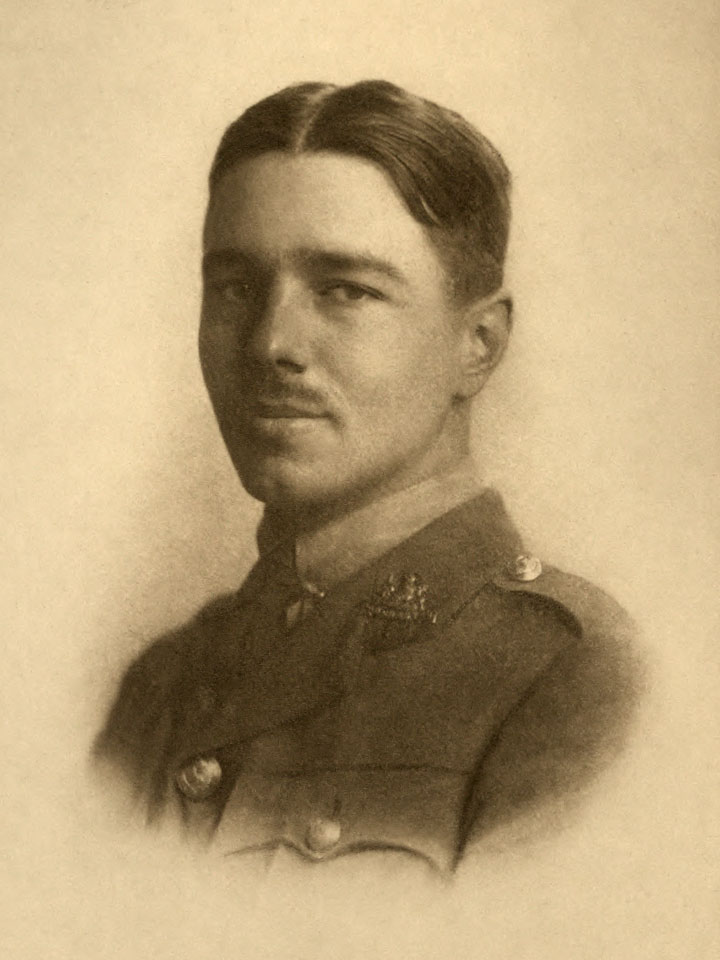Wilfred Owen
Birth Name: Wilfred Edward Salter Owen
Born: March 18, 1893 in Oswestry, Shropshire, England
Died: November 4, 1918 in Sambre-Oise Canal, near Ors, France
Time Period: Modern
Expertise: Poet, Soldier
Known For: Anthem for Doomed Youth, Dulce et Decorum Est, Futility, Strange Meeting

Quotes
Interesting quotes by Wilfred Owen
“My subject is War, and the pity of War. The Poetry is in the pity.”
“All I ask is to be held above the barren wastes of want.”
“Be bullied, be outraged, be killed, but do not kill.”
“I was a boy when I first realized that the fullest life liveable was a Poet’s.”
“All a poet can do today is warn.”
ADVERTISEMENT
Bio
A brief biography of Wilfred Owen
Wilfred Edward Salter Owen was born on March 18, 1893 in Oswestry, Shropshire, England. Owen is considered one of the forefront poets of World War I. A mere five poems of his were published before his unfortunate death—including “Dulce et Decorum est”, “Anthem for Doomed Youth” and “Futility”.
Wilfred Owen discovered his poetic abilities at the young age of ten, being shaped by the likes of John Keats, Percy Bysshe Shelley and other poets of the Romantic period. He was also influenced by the Bible, courtesy of growing up in a devout Christian family and having a deep connection with his mother. Owen started his education at Birkenhead Institute and finished at Shrewsbury Technical School. Unfortunately, he was unable to further his education at the time—even though he passed the exam to attend University of London—because he didn’t obtain a scholarship and his family was financially unable to support him. However, after Wilfred started working as a lay assistant, he was able to pursue his college education at University College, in Reading. His coursework started out in Botany, but then changed to literature when he started taking classes in Old English.
After his education, in 1913, Owen worked as an English and French tutor at Berlitz School of Languages in France, but war had broken out. Unsure of what to do—and even contemplating joining the French Army—Owen decided to return to England. Two years later, Owen signed up and joined the Artists Rifles Officers’ Training Corp, where he would train at Hare Hall Camp in Essex. In 1916, while on probation, he would be named Second Lieutenant in the Manchester Regiment.
Not long after this promotion, Wilfred was injured, suffering a concussion after falling into a shell hole. He spent a number of days unconscious before he was taken to Craig Lockhart War Hospital in Edinburgh. While being hospitalized, Owen met a poet named Siegfried Sassoon, who became his mentor—influencing Owen with his satires. In 1917, in combination with Sassoon and Owen’s doctor, his poetry would advance. It was Owen’s doctor who emboldened him during therapy to recount his experiences—notably the ones that occured in his dreams—and construct them into poetry. With Wilfred’s inspiration from Sassoon and beloved Romantic poets, he would establish the rawness and compassionate melancholy towards the time of circumstance, encapsulating it with a well-known line of his, “the pity of war.”
After his hospitalization in 1918, Owen decided to return to the front-lines, in efforts to continue his poetic documentation of the war. He led his platoon to invade key points of the enemy. This action lead him to receive a Military Cross for his determination and bravery—an award he always wanted. In his eyes, it marked him as a proper “war poet.” A month later, Wilfred Owen was killed in action—just a week before the war ended.
Wilfred Owen died on November 4, 1918 in Sambre-Oise Canal, France. His mother would receive the regrettable news on Armistice Day, while the church bells tolled in observance. Wilfred Owen was only twenty-five years old. He was buried at Ors Communal Cemetery in France. His mother would compliment his tombstone with his initials (W. O.) and an inscription written by her beloved son, “SHALL LIFE RENEW THESE BODIES? OF A TRUTH ALL DEATH WILL HE ANNUL.”
It wasn’t until after Wilfred Owen’s death that his body of work was published—often in collections. The first collection, Poems, was published in 1920, followed by The Poems of Wilfred Owen in 1931. Two more collections were published decades later—The Collected Poems of Wilfred Owen (1963) and The Complete Poems and Fragments (1983).
In 1975, Wilfred’s sister-in-law donated all writings—including letters and photographs—to Oxford University. These and other Wilfred Owen relics are open to the public by submitting an application to the English Faculty Librarian. In the decade following, Owen was honored in Westminster Abbey’s Poets’ Corner on a slate with other World War I poets, including his friend, Siegfried Sassoon. The slate is bordered with a quote of his surrounding their names: “My subject is War, and the pity of War. The Poetry is in the pity.” In addition to honoring Wilfred Owen’s life, in 1989, The Wilfred Owen Association was established. The association would set up perpetual memorials in the towns of Oswestry and Shrewsbury. Amongst the dedicated memorials to the fallen soldier, the association would also go on to schedule readings, talks, exhibitions and similar events to promote the recognition and appreciation of Wilfred Owen’s poetry.
ADVERTISEMENT
Works by Wilfred Owen

Download free Wilfred Owen books. Listen to Wilfred Owen audiobooks.

ADVERTISEMENT
External Links for Wilfred Owen
Wilfred Owen on Wikipedia
https://en.wikipedia.org/wiki/Wilfred_OwenWilfred Owen on Wikisource
https://en.wikisource.org/wiki/Author:Wilfred_OwenADVERTISEMENT
Other Authors

See other authors of the Modern period
- G. K. Chesterton
- James Bernard Fagan
- Ernest Hemingway
- Samuel Jackson Holmes
- H. P. Lovecraft
- Leo Szilard
- Nikola Tesla

